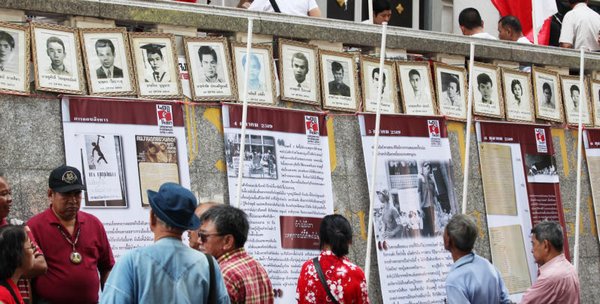A former key leader of the Oct 14, 1973, student uprising called on the red-shirt movement Sunday to join hands with other democratic forces in working towards sustainable democracy.

Visitors attend an exhibition commemorating the 40th anniversary of the Oct 14, 1973, student uprising at Thammasat University's Tha Prachan campus Sunday. (Photo by Pattanapong Hiranard)
Delivering a speech at Thammasat University to mark the 40th anniversary of the uprising, Seksan Prasertkul said the Oct 14 spirit was to fight against dictators and establish democracy.
- Opinion: Colours split the fighters
All parties concerned should stand firm with this philosophy as peace could only be maintained through democratic principles, he said.
Mr Seksan, a retired Thammasat University political scientist, said the October uprising created new, middle-class political groups - one urban movement concerned with natural resources and the environment, and a provincial group engaged in the representative parliamentary system.

Historic front pages from October, 1973, chronicle some of the highlights of the Oct. 14 uprising now celebrated as the true beginning of a democratic movement in Thailand.
"These two capitalist groups of urban and provincial middle-class movements have been incredibly good partners in striving against the old capitalist and political forces," Mr Seksan said.
He said the Oct 14 students movement had advocated fairer wages for labourers. But the capitalist political forces which have emerged recently have responded to the needs of the poor in a more substantial manner.
The former student leader, who was a member of the Reform Council during the Abhisit Vejjajiva administration, criticised the 2006 coup against the Thaksin Shinawatra government.
He said it overthrew an elected government in an unconstitutional way.
"Ultimately, the coup ushered in forces that wanted to drag parliament back to the old days when it was dictated by authoritarianism," Mr Seksan said.
Ironically, Mr Seksan said, many urban middle-class groups did not seem to uphold democratic principles and responded inappropriately to the mistakes of the Thaksin government.
The coup caused deep divisions in society, which has become fragmented and politically vulnerable to a civil war, he said. Mr Seksan suggested the red shirts embrace other democratic organisations.
"The movement should be a tool of the struggle for democracy and not to serve a single government or political party, unless the plight of their preferred party and leaders directly affect the survival of Thailand's democracy," Mr Seksan said. He said the quest for sustainable and peaceful political liberalism needed to be developed along with democratic principles.
"Democratisation is a delicate and complicated process since we need to deal with authoritarian cultural notions and, above all, to build equity and human dignity," Mr Seksan said.
He suggested activists needed to be constructive enough to convince others of the benefits of new values of democracy and allow different identities to gradually and naturally evolve.
Deconstructing the old paradigms right away was impractical as no new era could be ushered in without some connections from the old values. Peaceful transformation was the key spirit of the Oct 14 movement, Mr Seksan said.
"Democracy could not split means and aims," he said. "Democracy releases people from exploitation and merges their collective power."